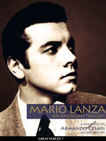An Awaited Biography
I was honored to write those notes, however, for—to put it plainly—Cesari's book is the Lanza biography that I had been waiting to read for thirty years. Back in the early 1980s, there was very little information about Lanza available: a long-out-of-print biography by his accompanist Constantine Callinicos; a salacious little paperback written under a pseudonym by its self-serving author; and a then-recently published exercise in sensationalism by the tenor's supposed best friend that read like an extended article for The National Enquirer. Nowhere was there a book that analyzed Lanza's actual singing or sought to explain why the most gifted American tenor of the twentieth century had essentially self-destructed by the age of thirty-eight. Worse still, at the time Lanza was either ignored by the musicological fraternity or treated patronizingly by the majority of music reviewers. A Lifetime Project It was against this depressing backdrop that singer and opera aficionado Armando Cesari decided to write his book. He began researching Lanza's life in earnest in the late 1970s, interviewing scores of the tenor's associates, and discovering in the process that, as he puts it, "The truth about the artist and the man [was] far less sensational, but by no means less interesting and a great deal more tragic than one might suspect."
But it was the interviews with Lanza's musical associates that made the most fascinating listening, for here Cesari was able to draw on his vocal expertise as he interviewed conductors such as José Iturbi, MGM's John Green, Warner Bros' Ray Heindorf, the distinguished Franco Ferrara (mentor to Riccardo Muti and others) from Rome's Academy of Santa Cecilia, as well as leading operatic singers such as George London, Dorothy Kirsten, and Licia Albanese. The insight that Cesari was able to glean from these luminaries provided him with powerful rebuttals to the many outrageous myths regarding Lanza's vocal gifts and musicality.
Of course, it's one thing to research a subject thoroughly, but quite another to be able to do it justice in prose. Happily, however, Cesari proved to be a born biographer, recognizing that there is far more to telling a subject's life than simply (and tediously) recounting that first s/he did this, and then s/he did that. Cesari constantly seeks to explain why Lanza behaved in certain ways, neither glossing over the man's failings nor sensationalizing them in the process. The result, as Pamela Margles of the classical music magazine Wholenote has observed, is the "best telling so far" of Lanza's life in a biography that "touches on too many aspects of talent and abuse to be overlooked." Amen to that——Derek McGovern. Biographer Armando Cesari talks in September 2012 to Roberto Scandurra, founder of the website MarioLanza.it, about a 1955 encounter between Mario Lanza and soprano Renata Tebaldi. An extended interview conducted in Italian appears on YouTube.
| |

